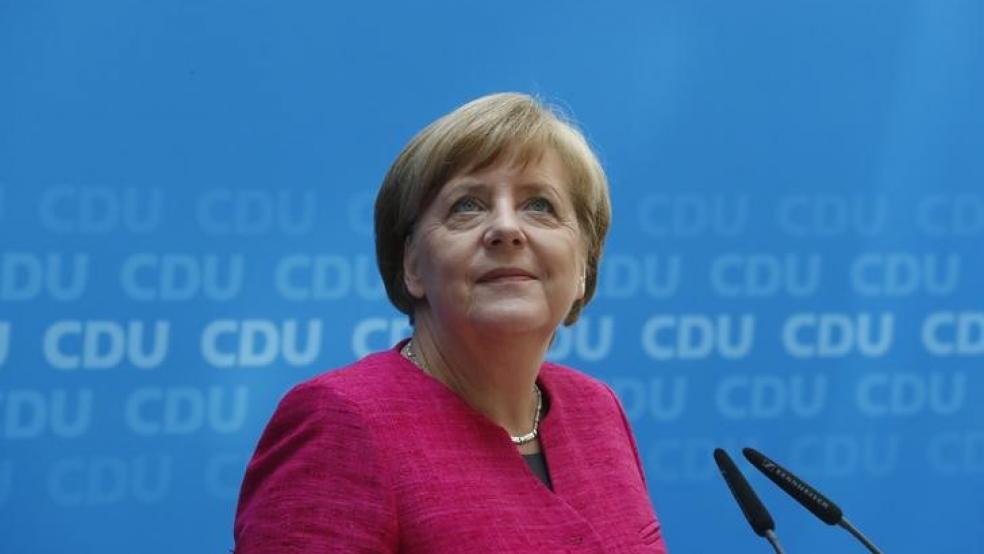BERLIN (Reuters) - A stunning election win for Angela Merkel's conservatives in Germany's most populous state is the strongest sign yet that voters have forgiven the chancellor for her open-door migrant policy and are set to hand her four more years in power.
Sunday's triumph in North Rhine-Westphalia marked the third regional election win this year for Merkel's Christian Democrats (CDU), providing them with powerful momentum as they head into a federal election on Sept. 24.The win reflected directly on the chancellor, who had placed herself at the center of campaigning in a state that has traditionally been a stronghold of her Social Democrat (SPD) rivals.It dealt a huge blow to new SPD leader Martin Schulz, who in February and March had boosted the party's poll ratings and raised its hopes of ending Merkel's 12 years in power.Images of smiling senior conservatives piling into CDU headquarters are a far cry from last year's headshaking, when poll ratings sagged and some allies even spoke of the end of the Merkel era."Merkel has risen from the ashes of 2016 when she was widely criticized for her open-arms policy on the refugees," said Josef Joffe, publisher of Die Zeit weekly.He argued that she was benefiting from a slowing of the migrant influx to about 280,000 last year from almost 900,000 in 2015. That is due to neighboring countries closing borders, an EU deal with Turkey to stem the flow, and some domestic action.Acknowledging voters' fears, Merkel's grand coalition of conservatives and the SPD has tried to speed up the processing of asylum requests, stepped up deportations and banned the burqa full face veil for state employees at work. "All seems forgiven. I have no doubt that her party will come out as the strongest in September, that she will gain a fourth term.... So four more years," Joffe told Reuters.Bild daily wrote that voters had rewarded local politicians who had shown they backed Merkel, and provided "something to think about" for those in the CDU who had called for her head.GLOBAL STANDINGAs the migrant crisis has receded in voters' minds, and the right-wing, anti-immigrant Alternative for Germany (AfD) has descended into infighting, Merkel has regained her role as an anchor of stability, especially amid fears of rising populism.Under her leadership, Europe's biggest economy is growing steadily and unemployment is at a record low. Television footage of U.S. President Donald Trump praising Germany's apprenticeship system, and talk of her budding friendship with his daughter Ivanka, remind cautious Germans of Merkel's global stature.In office since 2005, she is routinely rated by Forbes as the world's most powerful woman, and wields unparalleled clout in the European Union at a time when it is trying to map out a new direction after Britain's vote to leave."Angela Merkel is a cart horse for her party, the likes of which the SPD clearly doesn't have," wrote the conservative Frankfurter Allgemeine daily in an editorial. An unexpectedly strong result for the conservatives' preferred partner, the pro-business Free Democrats (FDP), in NRW means an alliance of the two may take power there.That could boost the FDP's hopes of forming a coalition with Merkel at national level after September's election, as they did during her second term from 2009 to 2013. But despite the boost to sentiment, FDP leader Christian Lindner said his party would not compromise on substance to share power, either in NRW or nationally.SPD DISASTERMerkel's state election gains, especially in NRW, are at least in equal measure the SPD's losses: on Monday, Bild daily dubbed the much-feted "Schulz effect" the "Schulz curse".Of the roughly 10-point gain in opinion polls that the party had initially seen under Schulz, about half has vanished, and it trails the conservatives by at least 7-8 points in most polls. Most analysts expect another grand coalition after the election, led by Merkel.The SPD, which has tried to blame its loss on local factors like infrastructure problems and crime, slumped to its lowest level of support in NRW since 1947.Many analysts say Schulz's focus on social justice, including plans to extend long-term unemployment benefit, is not enough. Politics professor Karl-Rudolf Korte from the University of Duisburg-Essen said the SPD needed a new start quickly if it was to have any chance of winning."They need to develop ideas for the future that ignite enthusiasm and mobilize voters, not just on social justice." Schulz, who said the NRW result was a bitter personal setback, on Monday pinpointed investment, innovation, education and a strong Europe as areas to focus on.But analysts say security is also a weakness for the SPD. The party was punished in NRW for its handling of the mass groping of women in Cologne on New Year's Eve 2015. And the Tunisian man who rammed a truck into Berlin's Christmas market last year, killing 12 people, had links to NRW.Compounding the SPD's problems, pollsters say, is voter concern about the prospect of a leftist coalition on the federal level between the SPD, Greens and radical Left party.SPD leaders are banking on another bounce. Some commentators pointed to the 2005 federal election, called by SPD chancellor Gerhard Schroeder after losing NRW, where Merkel squandered a hefty poll lead to win by just a whisker. "It will be a long, bumpy path," said Schulz to his dejected supporters on Monday. (Editing by Mark Trevelyan)Forgiven for migrant crisis, Merkel in pole position for fourth term

Hannibal Hanschke



